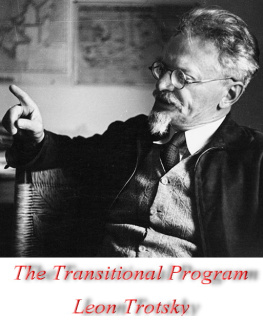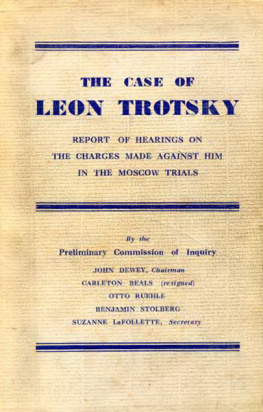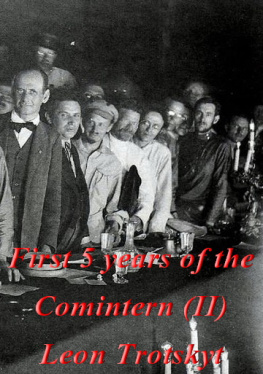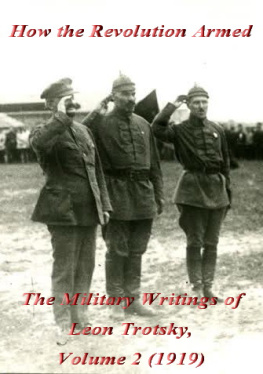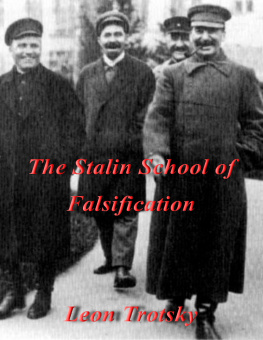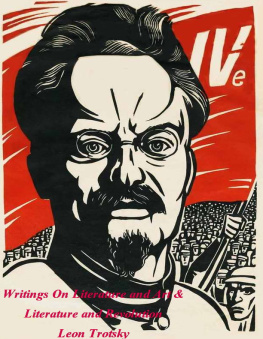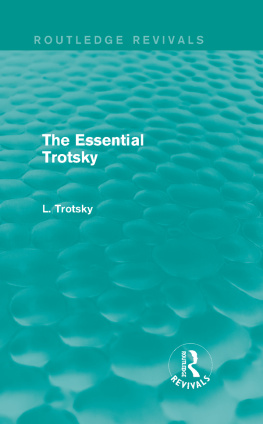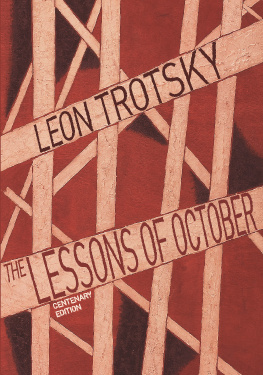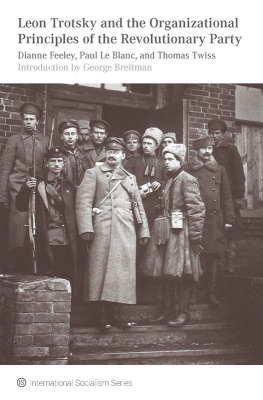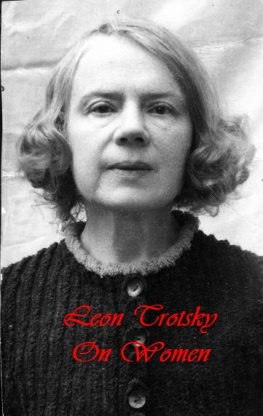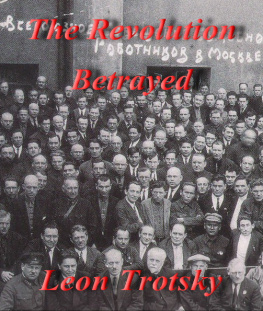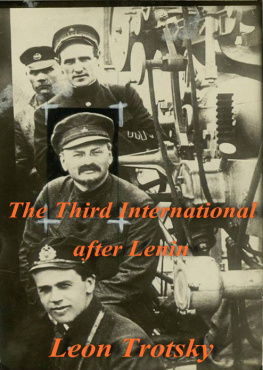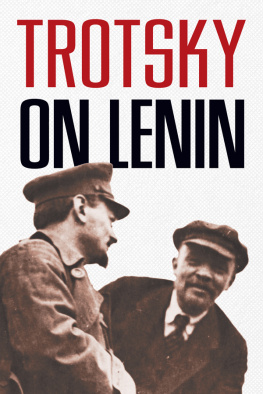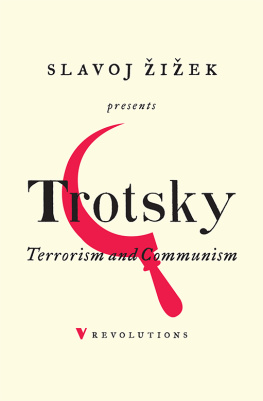Trotsky - The Transitional Program
Here you can read online Trotsky - The Transitional Program full text of the book (entire story) in english for free. Download pdf and epub, get meaning, cover and reviews about this ebook. year: 1938, publisher: Marxists Internet Archive, genre: Politics. Description of the work, (preface) as well as reviews are available. Best literature library LitArk.com created for fans of good reading and offers a wide selection of genres:
Romance novel
Science fiction
Adventure
Detective
Science
History
Home and family
Prose
Art
Politics
Computer
Non-fiction
Religion
Business
Children
Humor
Choose a favorite category and find really read worthwhile books. Enjoy immersion in the world of imagination, feel the emotions of the characters or learn something new for yourself, make an fascinating discovery.
The Transitional Program: summary, description and annotation
We offer to read an annotation, description, summary or preface (depends on what the author of the book "The Transitional Program" wrote himself). If you haven't found the necessary information about the book — write in the comments, we will try to find it.
The Transitional Program — read online for free the complete book (whole text) full work
Below is the text of the book, divided by pages. System saving the place of the last page read, allows you to conveniently read the book "The Transitional Program" online for free, without having to search again every time where you left off. Put a bookmark, and you can go to the page where you finished reading at any time.
Font size:
Interval:
Bookmark:
The Mobilization of the Masses around Transitional Demands to Prepare the Conquest of Power
- The Objective Prerequisites for a Socialist Revolution
- The Proletariat and its Leadership
- The Minimum Program and the Transitional Program
- Sliding Scale of Wages and Sliding Scale of Hours
- Trade Unions in the Transitional Epoch
- Factory Committees
- Business Secrets and Workers Control of Industry
- Expropriation of Separate Groups of Capitalists
- Expropriation of the Private Banks and State-ization of the Credit System
- The Picket Line Defense Guards/Workers Militia The Arming of the Proletariat
- The Alliance of Workers and Farmers
- The Struggle Against Imperialism and War
- Workers and Farmers Government
- Soviets
- Backward Countries and the Program of Transitional Demands
- The Program of Transitional Demands in Fascist Countries
- The USSR and Problems of the Transitional Epoch
- Against Opportunism and Unprincipled Revisionism
- Against Sectarianism
- Open the Road to the Woman Worker! Open the Road to the Youth!
- Under the Banner of the Fourth International!
- Appendix: A Discussion with Trotsky on the Transitional Program
T he world political situation as a whole is chiefly characterized by a historical crisis of the leadership of the proletariat.
The economic prerequisite for the proletarian revolution has already in general achieved the highest point of fruition that can be reached under capitalism. Mankinds productive forces stagnate. Already new inventions and improvements fail to raise the level of material wealth. Conjunctural crises under the conditions of the social crisis of the whole capitalist system inflict ever heavier deprivations and sufferings upon the masses. Growing unemployment, in its turn, deepens the financial crisis of the state and undermines the unstable monetary systems. Democratic regimes, as well as fascist, stagger on from one bankruptcy to another.
The bourgeoisie itself sees no way out. In countries where it has already been forced to stake its last upon the card of fascism, it now toboggans with closed eyes toward an economic and military catastrophe. In the historically privileged countries, i.e., in those where the bourgeoisie can still for a certain period permit itself the luxury of democracy at the expense of national accumulations (Great Britain, France, United States, etc.), all of capitals traditional parties are in a state of perplexity bordering on a paralysis of will.
The New Deal, despite its first period of pretentious resoluteness, represents but a special form of political perplexity, possible only in a country where the bourgeoisie succeeded in accumulating incalculable wealth. The present crisis, far from having run its full course, has already succeeded in showing that New Deal politics, like Popular Front politics in France, opens no new exit from the economic blind alley.
International relations present no better picture. Under the increasing tension of capitalist disintegration, imperialist antagonisms reach an impasse at the height of which separate clashes and bloody local disturbances (Ethiopia, Spain, the Far East, Central Europe) must inevitably coalesce into a conflagration of world dimensions. The bourgeoisie, of course, is aware of the mortal danger to its domination represented by a new war. But that class is now immeasurably less capable of averting war than on the eve of 1914.
All talk to the effect that historical conditions have not yet ripened for socialism is the product of ignorance or conscious deception. The objective prerequisites for the proletarian revolution have not only ripened; they have begun to get somewhat rotten. Without a socialist revolution, in the next historical period at that, a catastrophe threatens the whole culture of mankind. The turn is now to the proletariat, i.e., chiefly to its revolutionary vanguard. The historical crisis of mankind is reduced to the crisis of the revolutionary leadership.
The economy, the state, the politics of the bourgeoisie and its international relations are completely blighted by a social crisis, characteristic of a prerevolutionary state of society. The chief obstacle in the path of transforming the prerevolutionary into a revolutionary state is the opportunist character of proletarian leadership: its petty bourgeois cowardice before the big bourgeoisie and its perfidious connection with it even in its death agony.
In all countries the proletariat is racked by a deep disquiet. The multimillioned masses again and again enter the road of revolution. But each time they are blocked by their own conservative bureaucratic machines.
The Spanish proletariat has made a series of heroic attempts since April 1931 to take power in its hands and guide the fate of society. However, its own parties (Social Democrats, Stalinists, Anarchists, POUMists) each in its own way acted as a brake and thus prepared Francos triumphs.
In France, the great wave of sit down strikes, particularly during June 1936, revealed the wholehearted readiness of the proletariat to overthrow the capitalist system. However, the leading organizations (Socialists, Stalinists, Syndicalists) under the label of the Popular Front succeeded in canalizing and damming, at least temporarily, the revolutionary stream.
The unprecedented wave of sit down strikes and the amazingly rapid growth of industrial unionism in the United States (the CIO) is the most indisputable expression of the instinctive striving of the American workers to raise themselves to the level of the tasks imposed on them by history. But here. too, the leading political organizations, including the newly created CIO, do everything possible to keep in check and paralyze the revolutionary pressure of the masses.
The definite passing over of the Comintern to the side of bourgeois order, its cynically counterrevolutionary role throughout the world, particularly in Spain, France, the United States and other democratic countries, created exceptional supplementary difficulties for the world proletariat. Under the banner of the October Revolution, the conciliatory politics practiced by the Peoples Front doom the working class to impotence and clear the road for fascism.
Peoples Fronts on the one hand fascism on the other: these are the last political resources of imperialism in the struggle against the proletarian revolution. From the historical point of view, however, both these resources are stopgaps. The decay of capitalism continues under the sign of the Phrygian cap in France as under the sign of the swastika in Germany. Nothing short of the overthrow of the bourgeoisie can open a road out.
The orientation of the masses is determined first by the objective conditions of decaying capitalism, and second, by the treacherous politics of the old workers organizations. Of these factors, the first, of course, is the decisive one: the laws of history are stronger than the bureaucratic apparatus. No matter how the methods of the social betrayers differ from the social legislation of Blum to the judicial frame-ups of Stalin they will never succeed in breaking the revolutionary will of the proletariat. As time goes on, their desperate efforts to hold back the wheel of history will demonstrate more clearly to the masses that the crisis of the proletarian leadership, having become the crisis in mankinds culture, can be resolved only by the Fourth International.
Font size:
Interval:
Bookmark:
Similar books «The Transitional Program»
Look at similar books to The Transitional Program. We have selected literature similar in name and meaning in the hope of providing readers with more options to find new, interesting, not yet read works.
Discussion, reviews of the book The Transitional Program and just readers' own opinions. Leave your comments, write what you think about the work, its meaning or the main characters. Specify what exactly you liked and what you didn't like, and why you think so.

